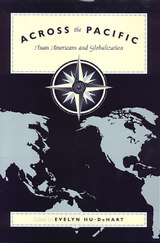
Members of the Asian American community have always been trans-Pacific, but are now more than ever, since the 1965 change in U.S. immigration law. Entering the U.S. at the culmination of the Civil Rights movement, Asians becoming Asian Americans have joined a self-consciously multicultural society. Asian economies roared onto the world stage, creating new markets while circulating capital and labor at an unprecedented scale and intensity, thereby helping drive the forces of modern globalization. These essays by well-known scholars in the field of Asian American studies consider such topics as the impact of new migrations on Asian American subjectivity and politics, Asian American activism and U.S. foreign policy, and the role of Asian Americans in Pacific Rim economies.
Considering issues of diaspora, transmigrancy, assimilation, institutionalized racism, and community, Across the Pacific covers such cutting-edge subjects as the cultural expressions of dislocation among contemporary Asian American writers, as well as the impact of the new migrations on Asian American subjectivity and politics.
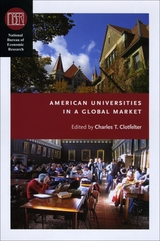
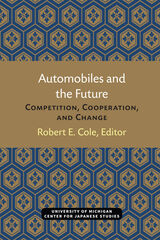
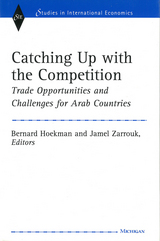
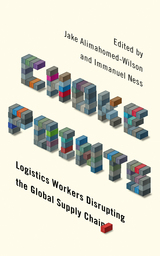
But there are vulnerabilities, and Choke Points reveals them—and the ways that workers are finding ways to make use of the power that those choke points afford them. Exploring a number of case studies around the world, this book uncovers a little-known network of resistance by logistics workers worldwide who are determined to contest their exploitation by the forces of global capital. Through close accounts of wildcat strikes, roadblocks, and boycotts, from South China to Southern California, the contributors build a picture of a movement that flies under the radar, but carries the potential to force dramatic change.

As corporations search for new production sites, governments compete furiously using location subsidies and tax incentives to lure them. Yet underwriting big business can have its costs: reduction in economic efficiency, shifting of tax burdens, worsening of economic inequalities, or environmental degradation.
Competing for Capital is one of the first books to analyze competition for investment in order to suggest ways of controlling the effects of capital mobility. Comparing the European Union's strict regulation of state aid to business with the virtually unregulated investment competition in the United States and Canada, Kenneth P. Thomas documents Europe's relative success in controlling—and decreasing—subsidies to business, even while they rise in the United States.
Thomas provides an extensive history of the powers granted to the EU's governing European Commission for controlling subsidies and draws on data to show that those efforts are paying off. In reviewing trends in North America, he offers the first comprehensive estimate of U.S. subsidies to business at all levels to show that the United States is a much higher subsidizer than it portrays itself as being.
Thomas then suggests what we might learn from the European experience to control the effects of capital mobility—not only within or between states, but also globally, within NAFTA and the World Trade Organization as well. He concludes with policy recommendations to help promote international cooperation and cross-fertilization of ways to control competition for investment.

With the nations of the world becoming more interdependent, it is imperative to take international influences into account in understanding the organization of industry within a country. This book extends the structure/conduct/performance framework of analysis to present a fully specified simultaneous equation model of an open economy—Canada.
By estimating a system of equations of all the major variables, the authors can identify which variables are dependent and which are independent. They are thus able to assess the relative importance of such factors as seller concentration, import competition, retailing structure, advertising expenditure, research and development spending, and technical and allocative efficiency in shaping the organization of industry in Canada. In addition, using both industry-level and firm-level data, the authors develop methods for assessing the effect of structural variables on diversification strategies and the consequences for market performance. They also study the effects of such variables on firms’ access to capital markets. The book concludes with a discussion of the implications of the findings for government policy.
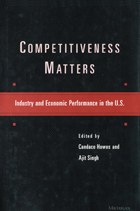
competitiveness is a dangerous obsession that distracts us from the question most central to solving the problem of stagnant real income growth, namely, what causes productivity growth, especially in the service sector.
The central argument is that, if the U.S. economy is to achieve full employment with rising real wages, it is necessary to enhance the competitiveness of its tradable goods sector. The book shows that current account deficits cannot be explained by macroeconomic mismanagement but are rather the consequence of an uncompetitive manufacturing sector. It finds that the long-term health of the manufacturing sector requires not only across-the-board policies to remedy problems of low or inefficient investment, but also sectoral policies to address problems that are strategic to resolving the balance of payments problems. Lessons are drawn from the experience of some European and Asian countries.
This book will be of interest to economists, political scientists, and business researchers concerned with the place of the manufacturing sector in overall health of the U.S. economy, with issues of industrial policy and industrial restructuring, and with the conditions for rising standards of living.
Candace Howes is Associate Professor, Barbara Hogate Ferrin Chair, Connecticut College. Ajit Singh is Professor of Economics, Queens College, Cambridge.
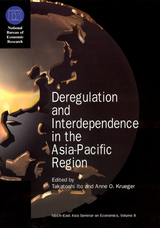

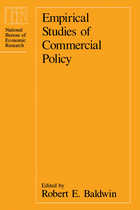
Marked by a shift from a traditional reliance on simulation models, these papers take their inspiration from recent changes in the assumptions traditionally underlying research in international trade theory. No longer are government policies viewed as being somehow "given" to the researcher; in part 1, "Analyses with a Political Economy Perspective," four papers treat such policies as endogenous and explicable in terms of political economy. Neither are product and factor markets seen as perfectly competitive; instead, the three papers in part 2, "Trade Policy Effects under Imperfectly Competitive Market Conditions," assume that firms consider the actions of other companies when formulating their decisions. In part 3, "A New Measure of Trade Restrictiveness and Estimates of Trade Policy Effects with CGE Models," the first essay explores the quantitative restrictions on cheese to develop and implement a new model of restrictive trade. Two final contributions address problems for which simulation modeling is especially useful. The first considers the effectiveness of an import surcharge in reducing the U.S. trade deficit and the second treats the welfare effects of liberalization in South Korea where increasing returns to scale are significant
These innovative studies focus on economic behavior that will provide valuable insights for policymakers, academic economists, and students.
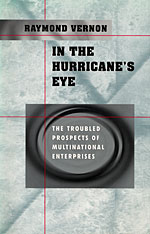
The world’s multinational enterprises face a spell of rough weather, political economist Ray Vernon argues, not only from the host countries in which they have established their subsidiaries, but also from their home countries. Such enterprises—a few thousand in number, including Microsoft, Toyota, IBM, Siemens, Samsung, and others—now generate about half of the world’s industrial output and half of the world’s foreign trade; so any change in the relatively benign climate in which they have operated over the past decade will create serious tensions in international economic relations.
The warnings of such a change are already here. In the United States, interests such as labor are increasingly hostile to what they see as the costs and uncertainties of an open economy. In Europe, those who want to preserve the social safety net and those who feel that the net must be dismantled are increasingly at odds. In Japan, the talk of “hollowing out” takes on a new urgency as the country’s “lifetime employment” practices are threatened and as public and private institutions are subjected to unaccustomed stress. The tendency of multinationals in different countries to find common cause in open markets, strong patents and trademarks, and international technical standards has been viewed as a loss of national sovereignty and a weakening of the nation-state system, producing hostile reactions in home countries.
The challenge for policy makers, Vernon argues, is to bridge the quite different regimes of the multinational enterprise and the nation-state. Both have a major role to play, and yet must make basic changes in their practices and policies to accommodate each other.

During the 1970s and 1980s, American manufacturing enterprises saw their technological dominance challenged by increasingly tough competition from abroad. This book investigates business responses to those challenges. On average, F. M. Scherer shows, 308 U.S. companies reacted to rising imports of high-technology products by cutting back research and development expenditures as a percentage of sales. The cutbacks were particularly large in industries protected by voluntary trade restraint agreements and other trade barriers.
Using statistical data and eleven in-depth case studies, Scherer finds that company responses to new high-technology competition from abroad were highly diverse. Aggressive reactions predominated in firms producing color film, wet shavers, medical imaging apparatus, fiber optics, and earth-moving equipment. But the efforts of U.S. manufacturers in other lines such as color television, VCRs, and facsimile machines, were too meager to repel technologically innovative overseas challengers. Exploring why reactions differed so much from case to case, Scherer finds systematic explanations in such variables as the multinationality of enterprises, domestic market structure, links to academic science bases, and the educational background of top managers. He concludes by offering proposals to improve the competitiveness of American high-technology companies.
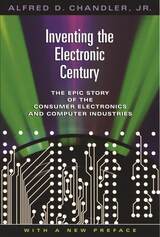
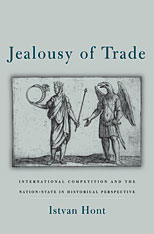
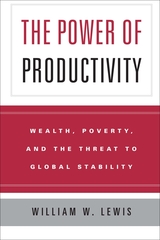
The Power of Productivity provides powerful and controversial answers to these questions. William W. Lewis, the director emeritus of the McKinsey Global Institute, here draws on extensive microeconomic studies of thirteen nations over twelve years—conducted by the Institute itself—to counter virtually all prevailing wisdom about how best to ameliorate economic disparity. Lewis's research, which included studying everything from state-of-the-art auto makers to black-market street vendors and mom-and-pop stores, conclusively demonstrates that, contrary to popular belief, providing more capital to poor nations is not the best way to help them. Nor is improving levels of education, exchange-rate flexibility, or government solvency enough. Rather, the key to improving economic conditions in poor countries, argues Lewis, is increasing productivity through intense, fair competition and protecting consumer rights.
As The Power of Productivity explains, this sweeping solution affects the economies of poor nations at all levels—from the viability of major industries to how the average consumer thinks about his or her purchases. Policies must be enacted in developing nations that reflect a consumer rather than a producer mindset and an attendant sense of consumer rights. Only one force, Lewis claims, can stand up to producer special privileges—consumer interests.
The Institute's unprecedented research method and Lewis's years of experience with economic policy combine to make The Power of Productivity the most authoritative and compelling view of the global economy today, one that will inform political and economic debate throughout the world for years to come.
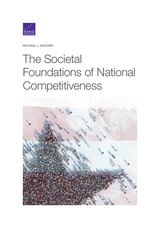
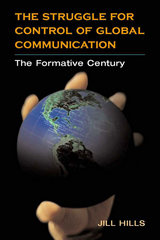
Tracing the development of communication markets and the regulation of international communications from the 1840s through World War I, Jill Hills examines the political, technological, and economic forces at work during the formative century of global communication.
Hills analyzes power relations within the arena of global communications from the inception of the telegraph through the successive technologies of submarine telegraph cables, ship-to-shore wireless, broadcast radio, shortwave wireless, the telephone, and movies with sound. As she shows, global communication began to overtake transportation as an economic, political, and social force after the inception of the telegraph, which shifted communications from national to international. From that point on, information was a commodity and ownership of the communications infrastructure became valuable as the means of distributing information. The struggle for control of that infrastructure occurred in part because British control of communications hindered the growing economic power of the United States.
Hills outlines the technological advancements and regulations that allowed the United States to challenge British hegemony and enter the global communications market. She demonstrates that control of global communication was part of a complex web of relations between and within the government and corporations of Britain and the United States. Detailing the interplay between American federal regulation and economic power, Hills shows how these forces shaped communications technologies and illuminates the contemporary systems of power in global communications.
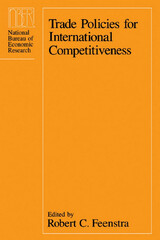
In Trade Policies for International Competitiveness, Robert C. Feenstra collects seven papers from the conference, each accompanied by discussants' comments, and adds a helpful introduction. Some of the issues considered by contributors are effects of macroeconomic and strategic foreign policies on competitiveness; the recent influx of foreign direct investment in the United States, primarily from Japan; the extent to which Japanese trade patterns are a reflection of underlying factor and endowments rather than trade barriers; and the market structure of Canadian industries, including applications for ongoing U.S.-Canadian free trade negotiations. Topical and provocative, these papers will be of value to economists, policymakers, and those in the business world.

This is the first book that explores the relationship between the United States and Japan in terms of the competition for industrial raw materials. With startling consistency, their responses to similar problems appear to stem from each country's history and culture, almost as if the country had no choice but to pursue the policy selected. Vernon suggests that in this field of policy, political leaders are prisoners of their national environment more than anyone--including the leaders themselves--has been prepared to recognize.
Examining in turn the world markets in oil, aluminum, copper, and steel, Vernon shows how Japan has learned to cope with its have-not status, using flexible and inventive national policies designed to help industries acquire what they need. The United States, on the other hand, lacking an explicit and consistent national policy, is torn between protecting domestic producers of these resources and trying to develop dependable sources of supplies abroad. The result is a haphazard and unstable raw-materials policy.
This unique commingling of political and economic analysis will appeal not only to scholars of international relations, domestic political behavior, and commodity markets but also to the informed layman who wishes to understand what is likely to happen as two economic superpowers range the world to satisfy their appetites for raw materials.
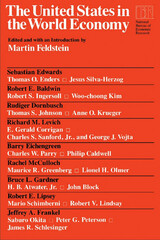
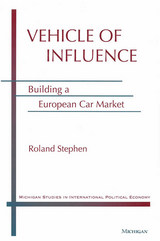
The book begins by reviewing the history of the EU and the logic of regional free trade, and goes on to develop a political explanation for the kinds of changes that actually occurred. The author argues that European automakers enjoyed a privileged place in the political arena, albeit one much transformed by the new institutions of the EU. Therefore, these firms often significantly influenced regional policy outcomes. The argument is applied to policymaking in the important areas of environmental regulation, trade, subsidies, and anti-trust regulation.
This work lies at the intersection of business, economics, and political science and is of interest to both experts and non-specialists with an interest in the tremendous economic and political changes brought about by the creation of a united Europe and, more generally, by the worldwide process of regional economic integration. Academics, professionals, businessmen, and leaders in government all have something to learn from the way in which firms and governments combined to build the largest car market in the world.
Roland Stephen is Assistant Professor in the Department of Political Science, North Carolina State University.

Today Japanese and many European automakers produce higher quality cars at lower cost than their American counterparts thanks to a flexible form of production characterized by long-term sole suppliers, assembly and supply plants located near each other, and just-in-time delivery of raw materials. While this style of production was, in fact, pioneered in the U.S. prior to World War II, in the years after the war, American automakers deliberately dismantled this system. As Murray and Schwartz show, flexible production accelerated innovation but also facilitated workers’ efforts to unionize plants and carry out work stoppages. To reduce the efficacy of strikes and combat the labor militancy that flourished between the Depression and the postwar period, the industry dispersed production across the nation, began maintaining large stockpiles of inventory, and eliminated single sourcing. While this restructuring of production did ultimately reduce workers’ leverage, it also decreased production efficiency and innovation. The U.S. auto industry has struggled ever since to compete with foreign automakers, and formerly thriving motor cities have suffered the consequences of mass deindustrialization.
Murray and Schwartz argue that new business models that reinstate flexible production and prioritize innovation rather than cheap labor could stem the outsourcing of jobs and help revive the auto industry. By clarifying the historical relationships between production processes, organized labor, and industrial innovation, Wrecked provides new insights into the inner workings and decline of the U.S. auto industry.
READERS
Browse our collection.
PUBLISHERS
See BiblioVault's publisher services.
STUDENT SERVICES
Files for college accessibility offices.
UChicago Accessibility Resources
home | accessibility | search | about | contact us
BiblioVault ® 2001 - 2024
The University of Chicago Press









